
In Kyoto, Japan, delegates from 159 nations approved a treaty to reduce global warming. Over the next 15 years, the United States, along with other industrialized nations, must cut its emissions of greenhouse gases to a level one-third below its currently projected output. The Los Angeles Times called it "the most significant multinational agreement ever on the world's environment." The Clinton administration praised the agreement while admitting it faced immediate gridlock: Developing countries refuse to reduce their emissions until industrialized countries do so, but the U.S. Senate refuses to ratify the treaty until developing countries sign on. (12/12)


A federal judge ordered Microsoft to stop requiring computer makers to bundle its Internet browser with Windows. The judge hasn't decided whether Microsoft violated antitrust laws, as the Justice Department contends, but he ordered the halt just to make sure that Microsoft doesn't devour the browser market while the case is in court. The Justice Department's spin: "Starting tomorrow, choice will be restored to the public." Microsoft's spin: 'Tis but a scratch. Netscape's spin: 'Tis but the first scratch. The superficial analysis: It's just a temporary order. The intermediate analysis: It will probably be in effect until at least June, screwing up the release of Windows 98, which was supposed to merge Microsoft's browser and operating system. The advanced analysis: Computer makers will keep bundling the browser with Windows anyway, because it's free. (12/12)
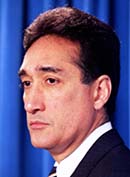

A grand jury indicted former Housing Secretary Henry Cisneros on 18 felony counts, including obstruction of justice and lying to the FBI. All the charges relate to his efforts to cover up an extramarital affair. Defenders say the affair is private and old news. Critics argue that while the affair may be private, the cover-up isn't. The press heaped might-have-beens on Cisneros. "There was a tragic element to his life story," waxed the New York Times. Cisneros is the second ex-Clinton Cabinet officer to be indicted--following Agriculture Secretary Mike Espy--and would have been the third, according to pundits, if Commerce Secretary Ron Brown hadn't died in a plane crash. (12/12)
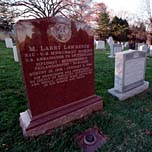

Update on the Arlington National Cemetery scandal: 1) Former U.S. Ambassador to Switzerland Larry Lawrence was dug up and removed from the cemetery along with his tombstone, which, according to the New York Times, "was engraved with lies" about his putative war injury. 2) Republicans and editorialists want further investigation to determine how Lawrence got in and what the rules are. (Slate dug up the details: See the "Cheat Sheet" titled "Arlington National Cemetery: Dying to get in? Here's how.") 3) A former aide to Rep. Dan Burton, R-Ind., who had expressed outrage over Lawrence, says Burton got a similar burial waiver for a former aide who had never served in the military. The old spin: Did Lawrence get a break in the vetting process because he was a big political donor? The new spin: Politicians are exploiting the scandal for partisan advantage rather than facing up to bipartisan abuse of military privileges. (12/12)
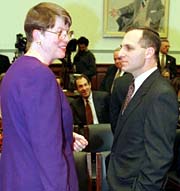

House Republicans interrogated Attorney General Janet Reno and FBI Director Louis Freeh about the campaign-finance scandal. Reno and Freeh refused to criticize each other or to discuss the memo in which Freeh had advised Reno to seek an independent counsel. Pundits expressed disappointment but no surprise at the lack of bloodshed. The spins: 1) Reno wins again. 2) The hearing was a distraction from newly released notes suggesting that White House officials counted on the Federal Election Commission's inability to enforce campaign-finance laws. 3) The phone-call issue was a distraction from the soft-money-abuse and conflict-of-interest issues that truly demand an independent counsel. 4) The independent-counsel question is a distraction from the question of whether Justice and the FBI will continue to pursue Clinton and Gore. 5) The whole investigation of Clinton's means of winning re-election is a distraction from the real scandal: that he intends to do nothing with the job. (12/10)
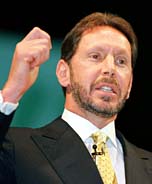

Oracle's stock plummeted 29 percent, breaking NASDAQ's official single-company daily trading volume record. CEO Larry Ellison lost more than $2 billion on paper. The reason: a disappointing earnings report. Oracle blamed Asia's woes and U.S. market saturation. Analysts debated whether this bodes ill for the whole technology sector. Contrarians called it a buying opportunity. The spins: 1) Tech stocks have climbed too far, too fast, and are due for a fall. 2) Tech stocks climb and fall too fast because their investors are too emotional. 3) Many analysts regard Oracle's wager on network computers (an alternative to PCs) as a wasteful distraction. (12/10)

It's open season on the United States in the Middle East. 1) Moderate Arab countries that boycotted a U.S.-sponsored conference last month are attending a global Islamic conference hosted by Iran, whose supreme cleric opened the meeting with a denunciation of the United States and its military presence in the Persian Gulf. Optimists focused on the more pluralistic, pro-Western speech by Iran's president. 2) Louis Farrakhan opened his world "friendship" tour by visiting Iraq in defiance of the U.S. government's objections. 3) In response to U.S. Secretary of State Madeleine Albright's expressions of impatience with Israel's alleged failure to fulfill the Oslo accords, Prime Minister Benjamin Netanyahu declared that "no external pressures" will make Israel budge. (12/10)

The American Medical Association proposed to legalize doctor-patient discussion of the possible benefits of medical marijuana. The AMA also urged the government to facilitate grant applications for studies on medical marijuana, including access to marijuana supplies. The story was overshadowed by the AMA's messy divorce from Sunbeam and its forswearing of all product endorsements. (12/10)
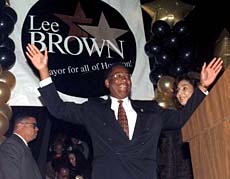

Miscellany: Businesses and many calling-card users are now being charged 28 cents for each pay-phone call to an 800 number. Consumer advocates call it a betrayal of the "toll-free" promise. Others respond that deregulation is properly making users bear the cost of these calls. Former federal drug czar Lee Brown was elected mayor of Houston. The national media touted him as the city's first nonwhite mayor but conceded that he will change almost nothing. The latest uproar against President Clinton's racial-dialogue project concerns a meeting in Dallas, moderated by Transportation Secretary Rodney Slater, to which only blacks were invited. The White House said it was a boo-boo and "won't be repeated."(12/8)

President Clinton changed the mission of U.S. nuclear-weapons policy. The old mission: waging nuclear war against a superpower. The new mission: deterring nuclear, biological, or chemical warfare by lesser powers (formalizing President Bush's implicit warning to Saddam Hussein during the Gulf War). One consequence is that the United States needs fewer land-based nukes since it is no longer planning all-out war with Russia. Meanwhile, Russia is debating whether to cut its conventional forces and authorize first use of its nukes as a substitute deterrent (as the United States will still do). (12/8)
